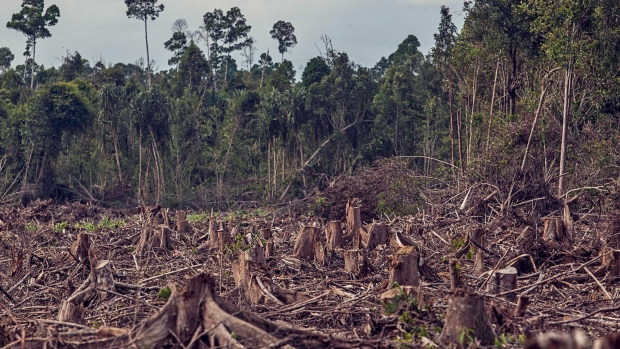Aug 14, 2019
We’re Killing the World’s Plants Faster Than We Thought
, Bloomberg News

(Bloomberg) -- The Earth is losing its plants, and humanity is to blame, according to a new study.
Global vegetation has been in decline since the late 1990’s, due to changes in the water content of the atmosphere. An atmospheric vapor pressure deficit (VPD), or the difference between saturation water vapor and actual water vapor, was found to stall or reverse vegetation greening trends, according to new research published in Science Advances.
Think of higher VPD as a pump, extracting water from soil and plants and effectively drying them out. As a plant senses moisture escaping, it closes its stomatal (a gatekeeper between the plant and the atmosphere) to reduce water loss, which also stops C02 from entering the plant’s leaves, halting photosynthesis and growth, according to lead author Wenping Yuan of Sun Yat-sen University.
Land vegetation and leaf coverage had been on the rise from 1982-98. While VPD had increased slightly prior to the late 1990’s, it increased at a greater pace afterward—up to 17 times faster, according to the data. VPD has since been climbing, becoming a major contributor to forest mortality over the past decades, the authors concluded. If conditions don’t change, there will be stronger green-house gas effects; less vegetation will also reduce crop, herb and forest stocks, according to Yuan.
Between 53% and 64% of vegetated areas globally experienced increased VPD trends since the late 1990’s, according to the data. The problem is only expected to get worse. The researchers forecast VPD will keep rising throughout the century, and call for its effects to be considered when assessing ecosystem responses to future climate conditions.
The research observed four global climate datasets from 1982 to 2015 to measure the effect of VPD on plant growth. A radiometer was used to indicate such growth.
To contact the author of this story: Luke McGrath in New York at lmcgrath18@bloomberg.net
To contact the editor responsible for this story: Joshua Petri at jpetri4@bloomberg.net
©2019 Bloomberg L.P.